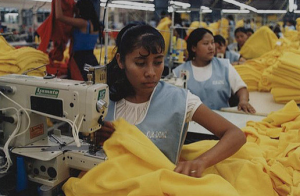Labor exploitation and the existence of sweatshops in global supply chains are longstanding issues that involve the exploitation of workers, often in developing countries, to produce goods for global markets. This study focuses on the key aspects of labor exploitation and sweatshops in global supply chains.

Labor Exploitation And Sweatshops In Global Supply Chains
Table of Contents
ToggleDefinition and Characteristics:
- Sweatshops:
- Sweatshops are workplaces where workers, often in low-wage industries, face harsh working conditions, long hours, low wages, and inadequate health and safety standards.
- Characteristics may include child labor, forced overtime, lack of job security, and limited workers’ rights.
Causes and Contributing Factors:
- Globalization and Outsourcing:
- Companies often outsource production to countries with lower labor costs to remain competitive in the global market. This can lead to the exploitation of workers in regions with lax labor regulations.
- Low Wages and Cost Pressure:
- Cost-cutting pressures from companies seeking to maximize profits contribute to low wages and poor working conditions in an attempt to keep production costs down.
- Lack of Labor Regulations:
- Some countries lack robust labor regulations or have insufficient enforcement mechanisms, allowing companies to exploit workers without facing significant consequences.
Consequences for Workers:
- Poor Working Conditions:
- Workers in sweatshops often endure unsafe and unhealthy working conditions, including inadequate ventilation, exposure to hazardous substances, and lack of protective equipment.
- Low Wages:
- Sweatshop workers typically receive low wages, often below the minimum wage, making it challenging for them to meet basic needs such as food, shelter, and healthcare.
- Child Labor:
- In some cases, sweatshops employ children who are subjected to labor exploitation, denying them access to education and proper development.
Corporate Responsibility:
- Supply Chain Responsibility:
- Companies are increasingly being held accountable for the working conditions in their supply chains. Ensuring responsible sourcing practices and ethical supply chain management is critical.
- Transparency and Accountability:
- Advocates emphasize the importance of transparency and accountability in supply chains. Companies are urged to disclose information about their suppliers and take steps to address labor exploitation.
- Corporate Social Responsibility (CSR):
- Adopting and implementing CSR initiatives that prioritize fair labor practices and worker welfare is seen as a positive step toward addressing labor exploitation.
Solutions and Interventions:
- Enforcement of Labor Laws:
- Governments and international organizations play a crucial role in enforcing and strengthening labor laws to protect workers’ rights and well-being.
- Worker Empowerment:
- Empowering workers through education, collective bargaining, and the formation of unions can be effective in improving working conditions and wages.
- Certification Programs:
- Certification programs, such as Fair Trade and other ethical labeling initiatives, aim to identify products that adhere to fair labor standards, giving consumers the option to support ethical practices.
- Collaborative Efforts:
- Collaboration among governments, businesses, non-governmental organizations (NGOs), and advocacy groups is essential to create and enforce regulations that address labor exploitation.
- Consumer Awareness:
- Raising awareness among consumers about the ethical implications of their purchasing decisions can drive demand for products produced under fair labor conditions.
In conclusion, addressing labor exploitation and sweatshops in global supply chains requires a comprehensive and collaborative approach involving governments, businesses, workers, and advocacy groups. Efforts to promote fair labor practices, enhance transparency, and hold companies accountable for the conditions in their supply chains are essential steps toward creating a more ethical and humane global workplace.
